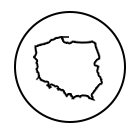Maria Jałowiec, Tadeusz Jałowiec, Priest from Lubcz
 Place
PlaceOpacionka
 People
PeopleJałowiec Maria
Jałowiec Tadeusz
In the village Opacionka (today Brzostek municipality) lived Maria and Kajetan Jałowiec with their 8 years old grandson, Tadeusz. Kajetan worked at their neighbor farm, Hersch Reiss. The outbreak of war changed lives of both families.
Maria was left on the farm alone with her grandson. Reiss family was arrested and taken to an unknown location. .
Maria was astonished, when in 1942 to her house came Hersch’s daughter, Rivka accompanied by another Jew. The girl asked for help. She explained that she managed to jump out of a moving cart when it slowed down on the turn. The rest of the family stayed inside. Then for two winters, the girl was hiding with other Jews in the forests. One day, when she slipped on ice and broke her leg, she decided, together with a friend Genka, to go to her native village and search there for help.
Maria decided to help the girls and hid them in the attic of the barn. She didn’t tell about it even to her grandson. However, she told him, every day to bring food in the bucket and leave it on the ground. The boy was banned to look up in the direction of the roof. When scared told Maria that he heard voices in the attic, she said it were, of course, cats.
One day, curiosity took over the boy and he looked. He saw that out from the straw were sticking someone’s leg. Tadeusz get to know then the truth, but decided to keep a secret.
One day the farm was passing by the German gendarmerie. The soldiers approached the house, and said that they will stay in the house as long as they are in the same area. The family was forced to move during this period to the attic. The officers took house and the soldiers were housed in tents. Maria also had to take care of their food. It lasted for two weeks. The situation was extremely dangerous because the barn was located 5m from the house. Rivka and Genia had an absolute ban on leaving the attic. Maria was bringing them food personally and only when she was sure no one was watching her.
Maria hid Jewish women for about two years. When it was safe, she used a special code for them: she knocked in the rafters of a barn.
At the end of 1944 to Opacionki came the Red Army, and with it the main front line. The Germans decided to evacuate the entire village. Maria knew that she can’t leave Rivka and Genka. The woman knew the German language well and asked one of the officers to let her stay home a few days longer as she had to took care of the animals. Before leaving she found for Jews new shelter. Maria went to the priest from Lubcz village as she knew that he was hiding 14 Jews. The priest also took Rivka and Genia.
At the turn of 1944 and 1945 the territories of Opacionki were liberated by the red Army. Rivka went to Jedlicz, where she found her brother Josef and his 14-year-old daughter Malka.
The woman decided to express her gratitude for saving her life. As she decided to move abroad with Josef and sister Renia – as the heirs of Hersch Reiss – she decided to give her family house to Maria.
After the war, Rivka and her husband Jakob Wallach settled in Australia. There were born their children: Sabina and Irving. As said Irving: „This extension of life would not be possible if not for the courage and righteousness of Maria Jałowiec and her 8-year-old grandson Tadeusz, who saved the daughter of the neighbors. My mother Rivka resist, to live a new life alongside her husband Jacob and to produce two children of their own. However, we fully can now understand the words of the Talmud, which says: „And if a person saves one life, it is as if saved the entire world”1.
Bibliography:
- FLV, List od Janiny Przewoźnik [70 rocznica zagłady brzosteckich Żydów, „Wiadomości Brzosteckie” 2012, nr 7], Nawsie Brzosteckie, 12.08.2013 r.
- FLV, Nagranie audio, sygn. Jałowiec Maria, Jantoń Jan, relacja Marii Ziarskiej z 02.09.2013 r.
DOCUMENTS:
No extra materials